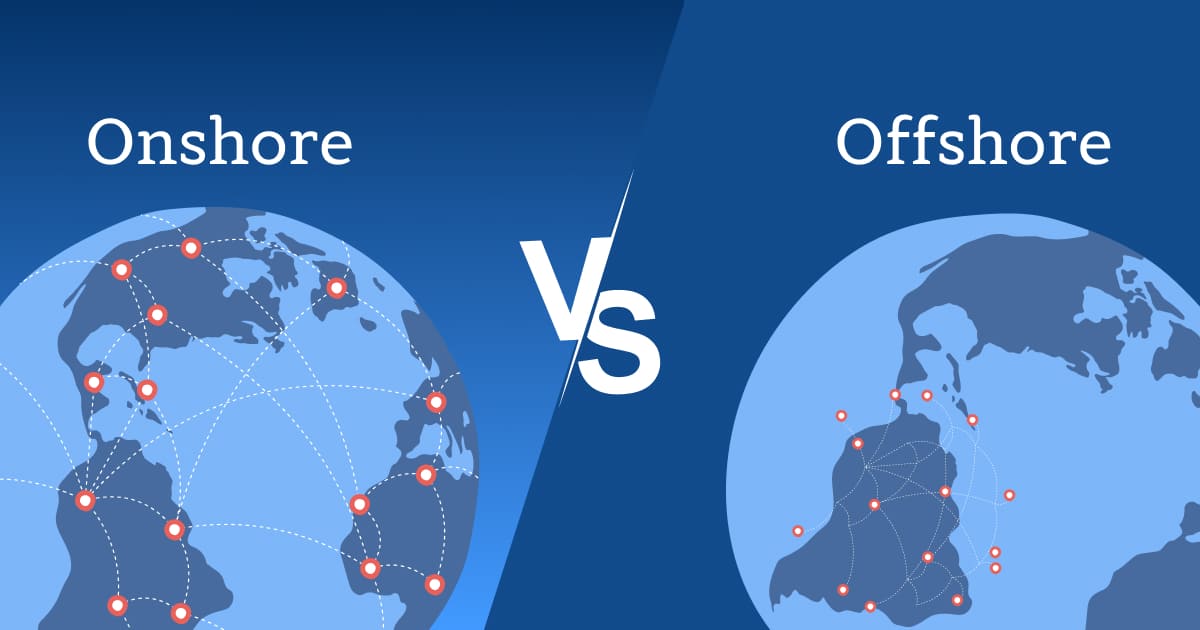
| December 28th, 2023 |
Onshore vs. Offshore Merchant Accounts — Which Suits Your Business?
In today’s interconnected global economy, businesses of all sizes are constantly seeking ways to expand their operations and increase revenue streams. One crucial aspect of facilitating this growth is the ability to accept electronic payments, which necessitates having a reliable merchant account. However, when it comes to choosing the right merchant account, businesses often face a critical decision: onshore or offshore. Understanding the fundamental differences between onshore and offshore merchant accounts is vital in making an informed decision that aligns with your business needs. Each option presents distinct advantages and disadvantages that can significantly impact your company’s financial operations, risk management, and growth potential.
Defining Onshore and Offshore Merchant Accounts —
Onshore Merchant Accounts:
An onshore merchant account refers to an arrangement where a business establishes its merchant account in the same country where its business operates. These accounts are typically subject to the laws, regulations, and financial standards of that specific country.
Advantages of Onshore Merchant Accounts —
Regulatory Compliance:
Easier adherence to local regulations and consumer protection laws is a significant advantage. Businesses operating within the same country as their merchant account often find it simpler to navigate and comply with the legal framework.
Customer Trust:
Local customers tend to have more confidence in transactions processed through familiar banking systems. This trust can positively impact sales and customer loyalty, crucial for sustained business growth.
Faster Access to Funds:
Proximity to financial institutions results in quicker access to funds. This swift access can be pivotal in maintaining healthy cash flow and supporting business operations.
Disadvantages of Onshore Merchant Accounts —
Stringent Requirements:
These accounts often come with more rigorous application processes and higher transaction fees, adding to the initial operational costs.
Limited International Reach:
Businesses may face restrictions in accepting payments from international customers, potentially limiting growth opportunities in global markets.
Higher Operational Costs:
Operating within regions with higher living standards and operational expenses can significantly increase the overall operational costs.
Advantages of Offshore Merchant Accounts —
Lower Taxes and Fees:
Offshore accounts may offer the benefit of lower tax rates and reduced transaction fees, contributing to potential cost savings.
Global Market Access:
The ability to accept payments from international customers without limitations expands market reach and revenue potential.
Reduced Regulations:
Less stringent regulations in certain offshore locations can mean easier account setup and fewer compliance requirements, streamlining the initial processes.
Disadvantages of Offshore Merchant Accounts —
Regulatory Complexity:
Navigating unfamiliar regulations and potential compliance challenges in a foreign jurisdiction can be time-consuming and complex.
Perception and Trust:
Some customers might perceive offshore transactions as less secure due to varying regulatory standards and unfamiliar banking systems.
Payment Processing Time:
Longer processing times due to international banking and fund transfer procedures can lead to delays in accessing funds.
Choosing the Right Fit for Your Business —
Factors to Consider:
- Nature of Business: Certain industries, like e-commerce or high-risk businesses, may fare better with either onshore or offshore accounts due to specific regulatory requirements or customer preferences.
- Risk Tolerance: Evaluate your business’s tolerance for regulatory risks and how comfortable you are with potential fluctuations in regulations, considering the impact on operations and financial stability.
- Transaction Volume and Geography: The geographical distribution of your customer base and the volume of international transactions your business processes are crucial factors in determining the suitability of onshore or offshore accounts.
- Cost Considerations: Assess the overall costs comprehensively, including setup fees, transaction fees, taxation implications, and ongoing operational expenses, associated with both onshore and offshore options.
Making an Informed Decision —
Assessing Compliance Needs:
Determine the level of regulatory compliance necessary for your business operations and how both onshore and offshore options align with these needs.
Evaluating Customer Trust:
Analyze how your choice of account might impact customer trust and perception, as this can significantly influence your brand’s image and customer loyalty.
Consulting Professionals:
Seek advice from financial consultants or legal experts with expertise in international financial regulations to ensure a well-informed decision aligned with your business goals.
Comparative Analysis:
Conduct a detailed comparison of fees, services, and benefits offered by onshore and offshore providers to make a data-driven decision that suits your business requirements.
Conclusion —
Selecting between an onshore or offshore merchant account demands a careful evaluation of your business’s unique requirements, risk appetite, and growth aspirations. Both options have their distinct advantages and challenges, and there is no one-size-fits-all solution. By weighing the pros and cons in alignment with your business goals, you can make an informed decision that optimally supports your financial operations and international expansion strategies. In summary, the choice between onshore and offshore merchant accounts is a strategic decision that necessitates thorough research and consideration of various factors. Ultimately, choosing the right merchant account is pivotal in establishing a robust financial infrastructure that fosters growth, mitigates risks, and caters to the evolving needs of your business in the global marketplace.